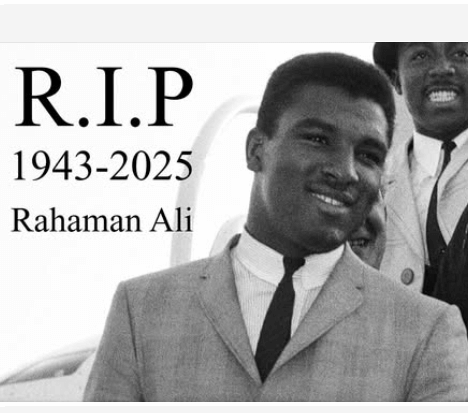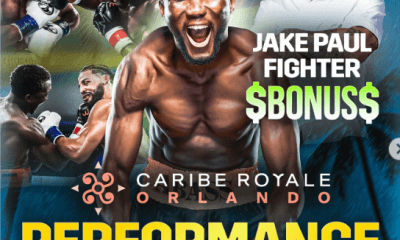Featured Articles
Rahaman Ali (1943-2025)

By THOMAS HAUSER — Rahaman Ali – the younger brother of Muhammad Ali – died on August 1 at age 82. The Louisville Courier Journal reported that he had been in hospice care since July 19.
Rudolph Arnett Clay (as he was once known) was born in Louisville on July 18, 1943.
“Louisville was segregated but it was a quiet city,” he told me decades ago. “There wasn’t much crime; no drugs; very little drinking or prostitution. Growing up, the only problems Muhammad and I had with whites were if we were walking in a certain part of town. If we were in the wrong place, white boys would come up in a car and say, ‘Hey, nigger, what are you doing here?’ I never got into any fights. No one attacked me. It wasn’t like in the Deep South. But people would call us nigger and tell us to get out if they thought we were someplace we didn’t belong.
“Muhammad and I had a few fights between us,” Rahaman continued. “All brothers do. But it was nothing serious; more like tests of strength, wrestling. Outside of boxing, he never played much sports. Now and then, we’d play touch football on the street. And he was fast. It was hard for the rest of us to make a tag on him because of his speed. But tackle football, he didn’t like. He wouldn’t play because he thought it was too rough. He was a great marbles player. He loved to shoot marbles. And all the time, he used to ask me to throw rocks at him. I thought he was crazy, but he’d stand back and dodge every one of them. No matter how many I threw, I could never hit him.”
Once Cassius Clay began attending Nation of Islam meetings in Miami in 1961, NOI founder Elijah Muhammad sent Jeremiah Shabazz (a minister with jurisdiction over the Deep South) to Florida to teach him.
“After Cassius had been with us about a month,” Shabazz later recalled, “he sent for his brother. Rudolph, or Rahaman, was even more enthused than he was. Cassius had a cautious side. Once he got his heart in it, he was with us all the way. But he was skeptical in the beginning. Some of the things he was hearing for the first time, he wanted to roll over in his mind and look at from different angles. Rahaman, on the other hand, was gung-ho from the start. He grabbed the whole thing and said, ‘That’s right; I want it!’ Even though it was Cassius who first became interested, Rahaman actually joined the Nation before he did.”
Then Rahaman followed his brother into boxing. His first fight was a split-decision win over a low-level club fighter named Chip Johnson on the undercard of Cassius Clay vs. Sonny Liston in Miami Beach on February 25, 1964.
Jerry Izenberg, who covered the event for the Newark Star-Ledger, later reminisced, “Things were absolutely crazy. I remember driving to the arena the night of the fight. In the car, I heard a report on the radio that Clay had been seen at the airport buying a ticket to leave town. I said to myself, ‘I have no idea what’s going on here.’ I couldn’t conceive of anything like this. Then I walked into the arena. And in the first or second bout of the evening, Rahaman, made his pro debut. It was a bad crowd for the night. Early in the evening, it was positively empty, like a canyon. I heard this voice, hollering. I turned around. And about halfway up the aisle, there was Cassius watching Rahaman, yelling instructions, really into the fight. And I said to myself, ‘There’s nothing wrong with this guy.’ I still didn’t think he was going to win. I’ve got to confess; at that point, I didn’t think Cassius could fight. But I said to myself, this might be an interesting night.”
Years later, Rahaman would say of that evening, “The greatest night of my life was February 25, 1964. That night was ecstasy. I was nervous, and he [Johnson] shook me up in the first round. He had me in a daze. Then my head cleared in the rest period between rounds, and I won a decision. But what that night was about for me was my brother winning the heavyweight championship. I’ve always shared in my brother’s joy. My whole life, his goals have been my goals. His happiness has been my happiness. His sorrow has been my sorrow. So when he became heavyweight champion of the world, I became champion too.”
Rahaman fought on the undercard of Muhammad’s fights on four more occasions:
* KO 2 over Buster Reed (the only fight of Reed’s career) on the undercard of Ali-Liston II in Lewiston, Maine, on May 25, 1965.
* KO 3 over Junior Grant (Grant’s eighth loss in a row) on the undercard of Muhammad’s comeback fight against Jerry Quarry in Atlanta on October 26, 1970.
* A four-round decision over Howard Darlington (who was winless in the last 19 fights of his career) on the undercard of Muhammad vs. Oscar Bonavena at Madison Square Garden on December 7, 1970; and finally
* Against Danny McAlinden, who won a six round decision over Rahaman on the undercard of Ali-Frazier I at Madison Square Garden on March 8, 1971 – the night when each brother suffered his first ring defeat.
Rahaman’s final fight was a September 13, 1972, knockout loss at the hands of Jack O’Halloran (who suffered 21 defeats in his ring career). After that fight Muhammad lay down the law regarding his brother, instructing those around him, “Get him out of the ring before he gets killed.” At that point, Rahman retired with a 14-3-1 (7 KO, 1 KO by) ring record. Two years later, when asked what his brother did, Muhammad answered, “I give him fifty thousand dollars a year for jiving and driving, and that’s not bad.”
Rahaman also played a role in the infamous January 23, 1974, studio brawl that occurred five days before Ali-Frazier II. Howard Cosell, who was at the center of the hostilities, later recalled, “ABC Sports was going to broadcast a tape of Ali-Frazier I, and we arranged for Ali and Joe to be in the studio to comment round-by-round. Everything went smoothly until Joe made a remark about Ali having to go to the hospital after the fight.”
As soon as the hospital comment left Frazier’s lips, Ali responded, “Why’d you say that about the hospital, Joe? Why’d you bring up the hospital? I wasn’t gonna talk about the hospital. Everybody knows I went to the hospital for ten minutes. You were in the hospital for three weeks. You’re ignorant, Joe.”
“Ignorant” was the catalyst. Frazier stood up, leaned over Ali, and demanded, “Why’d you call me ignorant?” At that point, Rahaman, who was in the studio, jumped onto the stage and moved toward Frazier, who snapped, “You want to get in this, too?” Then Ali rose from his chair and grabbed Frazier in the manner of a wrestler applying a bear hug. Ali was playing. Frazier wasn’t.
“The fight was real,” Dave Wolf (then a member of Frazier’s entourage) later recounted. “Joe was angry. Ali had called him ignorant once too often. But there was more to it than that. Rahaman had been heckling Joe from the first round of the tape on. He was only about ten feet from the stage. And every time the tape showed Ali landing a punch, Rahaman would shout, ‘Amen! Praise Allah! There it is again!’ And Joe started burning. It wasn’t just what Ali was saying. It was what Joe was hearing in the other ear as well. If we’d known that Rahaman would be allowed to act the way he did, there’s no question that Joe wouldn’t have gone. Rahaman was more of an instigator than Ali that afternoon.”
As the years passed, Rahaman receded from the limelight. He lent his name to two books that were a mixture of fact and fiction-disguised-as-fact. Like his brother, he began showing the effects of boxing. One might write his epitaph in words that Rahaman himself spoke thirty-five years ago:
“My brother’s health? What can I say. He became the most famous man in the world, and there’s a price he had to pay. He didn’t know where he’d be today. He didn’t care. And I don’t think he has any regrets about what he did with his life. He didn’t mean for some of these things to happen to him. But none of us can know the future. You make mistakes. What are you gonna do? Life’s that way.”
Thomas Hauser’s email address is thomashauserwriter@gmail.com. His most recent book – The Most Honest Sport: Two More Years Inside Boxing – is available at https://www.amazon.com/Most-Honest-Sport-Inside-Boxing/dp/1955836329
In 2019, Hauser was selected for boxing’s highest honor – induction into the International Boxing Hall of Fame.
To comment on this story in the Fight Forum CLICK HERE
-

 Featured Articles4 weeks ago
Featured Articles4 weeks agoThe Hauser Report: Zayas-Garcia, Pacquiao, Usyk, and the NYSAC
-

 Featured Articles3 weeks ago
Featured Articles3 weeks agoOscar Duarte and Regis Prograis Prevail on an Action-Packed Fight Card in Chicago
-

 Featured Articles3 weeks ago
Featured Articles3 weeks agoThe Hauser Report: Cinematic and Literary Notes
-

 Book Review2 weeks ago
Book Review2 weeks agoMark Kriegel’s New Book About Mike Tyson is a Must-Read
-

 Featured Articles5 days ago
Featured Articles5 days agoThe Hauser Report: Debunking Two Myths and Other Notes
-

 Featured Articles4 weeks ago
Featured Articles4 weeks agoRemembering Dwight Muhammad Qawi (1953-2025) and his Triumphant Return to Prison
-

 Featured Articles1 week ago
Featured Articles1 week agoMoses Itauma Continues his Rapid Rise; Steamrolls Dillian Whyte in Riyadh
-

 Featured Articles3 weeks ago
Featured Articles3 weeks agoTop Rank Boxing is in Limbo, but that Hasn’t Benched Robert Garcia’s Up-and-Comers




















